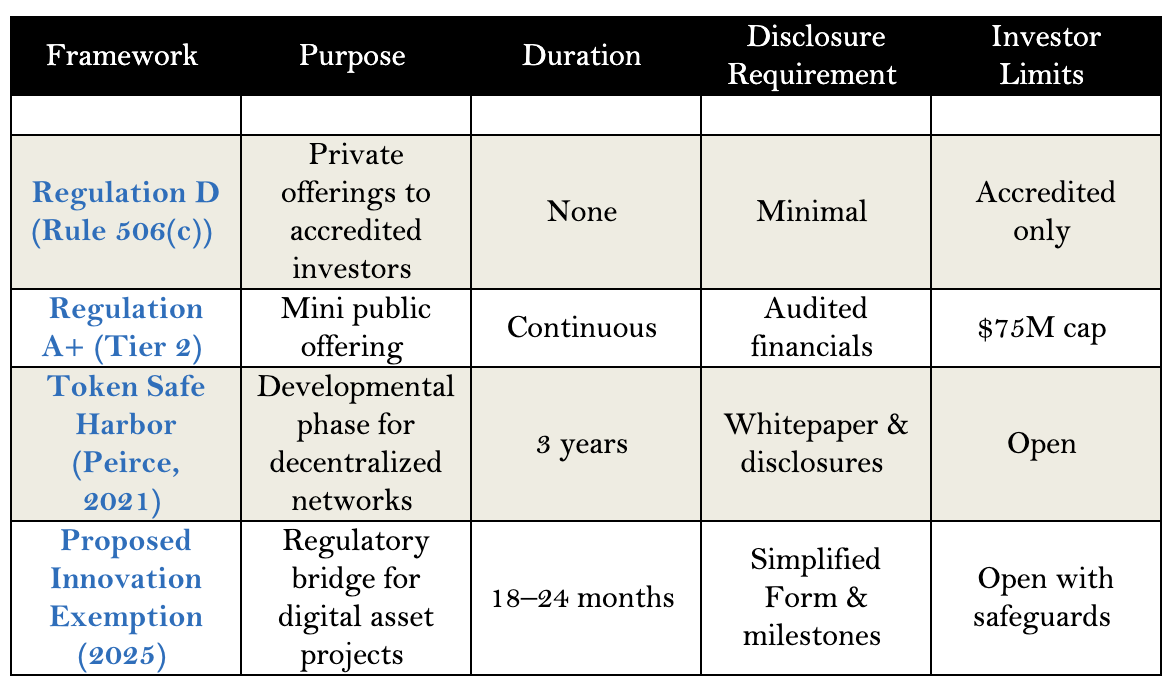Securities Law, NYSE, NASDAQ & OTC Markets Listings & Compliance
SEC to Formalize “Innovation Exemption” by Year-End: What It Means for Digital Asset Issuers and Market Participants
The U.S. Securities and Exchange Commission (SEC) is preparing to formalize a long-discussed “innovation exemption” by the end of 2025, according to recent statements from Chair Mark Atkins. The initiative is designed to provide regulatory flexibility for emerging technologies, including blockchain and tokenized assets, while maintaining investor-protection standards under existing securities laws.
Background: The Push for Regulatory Clarity
For years, startups in the blockchain and digital-asset sectors have argued that the SEC’s rules are overly restrictive and ill-suited for decentralized technologies. Projects often face the difficult choice between delaying innovation and risking enforcement under the Howey Test. Chair Atkins’s remarks suggest that the agency intends to codify a structured exemption similar in spirit to the “Token Safe Harbor” framework proposed in 2021 by then-Commissioner Hester Peirce, but updated to reflect lessons from recent enforcement cases and global regulatory alignment efforts.
Key Elements of the Innovation Exemption (Expected Framework)
- Limited-Duration Relief: A defined grace period (likely 18–24 months) allowing projects to develop networks or distribute digital assets before mandatory registration.
2. Disclosure Obligations: Issuers would need to publish key information about their teams, tokenomics, and network development milestones — similar to scaled Regulation A disclosure.
3. Investor Protections: Anti-fraud provisions and restrictions on insider trading or manipulative practices would remain fully applicable.
4. Reporting and Sunset Requirements: Projects would need to transition into full compliance, dissolve, or apply for continued exemptions at the end of the relief period.
5. Eligibility Criteria: The exemption would likely exclude high-risk or anonymous projects, shell entities, and those with prior securities violations.
Impact on Market Participants
If adopted, the exemption could provide a viable on-ramp for compliant token launches and reduce enforcement uncertainty that has chilled innovation in U.S. markets. For issuers, it could mean lower initial costs compared to a full SEC registration under Form S-1 or Regulation A.
For investors, the framework may increase transparency and confidence in early-stage blockchain ventures. Market intermediaries, including exchanges and broker-dealers, may also benefit from clearer guidance on listing and custody rules for digital assets issued under the exemption.
Comparison to Existing Safe Harbors and Exemptions
Challenges and Unresolved Issues
Despite its promise, the innovation exemption raises key legal and policy questions:
- How will the SEC define “sufficient decentralization” for transition out of the exemption?
- Will tokens sold under the exemption be freely tradable, or subject to resale restrictions like Rule 144?
- What oversight mechanisms will ensure investor protections during the exemption period?
- How will the SEC coordinate with FINRA, CFTC, and state regulators to ensure consistent supervision?
Global Context and Competitive Pressures
Other jurisdictions — including the U.K., EU, and Singapore — have already introduced sandbox frameworks to encourage responsible innovation. The SEC’s move could be seen as a response to global competition and the migration of blockchain projects offshore due to U.S. regulatory uncertainty.
Practical Steps for Issuers
Companies considering the innovation exemption should begin preparing now by:
- Conducting a Howey analysis of their token or digital asset;
- Drafting plain-English disclosures describing use of proceeds and development milestones;
- Implementing anti-fraud compliance and internal controls;
- Engaging securities counsel to navigate federal and state filing requirements.
Conclusion
The SEC’s innovation exemption could mark a historic turning point for the U.S. regulatory landscape — offering innovators a defined path to compliance without stifling technological progress. As the proposal moves toward finalization, issuers, investors, and advisors should monitor the SEC’s rulemaking docket and public-comment process closely.
If you have questions about this article or would like to speak with a Securities Attorney, Hamilton & Associates Law Group, P.A. is ready to help. Our Founder, Brenda Hamilton, is a nationally known and recognized securities attorney with over two decades of experience assisting issuers worldwide with going public on the Nasdaq, NYSE, and OTC Markets. Since 1998, Ms. Hamilton has been a leading voice in corporate and securities law, representing both domestic and international clients across diverse industries and jurisdictions. Whether you are taking your company public, raising capital, navigating regulatory challenges, or entering new markets, Brenda Hamilton and her team deliver the experience, strategic insight, and results-driven representation you need to succeed.
To speak with a Securities Attorney, please contact Brenda Hamilton at 200 E Palmetto Rd, Suite 103, Boca Raton, Florida, (561) 416-8956, or by email at [email protected].
Hamilton & Associates | Securities Attorneys
Brenda Hamilton, Securities Attorney
200 E Palmetto Rd, Suite 103
Boca Raton, Florida 33432
Telephone: (561) 416-8956
Facsimile: (561) 416-2855
www.SecuritiesLawyer101.com








